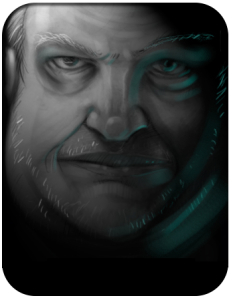DETECTIVE MOXLEY, Part 17: “Rena Terry”
“Geez, Fran, can’t you change that?” asked Moxley, looking up from his corner booth at Row’s. He was nursing a cup of coffee he couldn’t afford, once more absorbed in the dozens of detailed case files Ray Neiring had amassed in the last weeks of his life. As the waitress continued to ignore him — Row’s was famous for its human staff — Moxley thumbed the face of his phone for the tenth time, automatically redialing Sheb’s ID. He got the same message prompt he’d received nine times before that. Either Sheb had blacklisted Moxley’s number, or the man was already dead, murdered by the whatever-it-was that had stolen his face. Mox had left messages with Government Inspection and with half a dozen other people around town who might have seen or talked to Sheb. He was coming up empty anyway.
The screens in Row’s, meanwhile, were broadcasting a dull-as-toast public Council meeting, some kind of PR meet-and-greet going on at a platform erected near the Wanfujing. Citizens were addressing the seated council members from a podium at the edge of the platform. There was a pretty hefty crowd, and the broadcast was being carried by all of the near-cast transmitters in this part of town. Fran, perhaps belatedly under the impression Moxley could tip her, switched the screen through several of the feeds to which Row’s subscribed. The Council meeting was on each of them.
The sheer volume of the data was the problem. Ray was a methodical, meticulous investigator. He accumulated as much information as possible, some of it only barely relevant, on the theory that it was better to have it and not need it than to come up wanting during a search. Mox was left to sift through all this and wonder if he was wasting his time. Ray’s open case files did not exactly contain a road map to understanding what was going through the man’s mind. Moxley had only a few terse notes and other addenda to give him any clue as to what was significant and what was not.
But the answer had to be here. It had to be. Do the homework, Web would have told him. Put in the time. Find the data. Make the money.
Too bad it was never that easy, Moxley thought, pinching the bridge of his nose. He had been reading for a couple of hours now and his eyes were starting to water from the strain. He probably needed a refraction treatment. Yeah, well. He’d once rescheduled a dental appointment five years ago and never showed up. He’d eventually get to that, too.
“Talk to me, Ray,” Moxley said. “If you can’t tell me who killed you, tell me why they did it.”
“Harold Moxley?” said a voice.
Moxley looked up from the tab and felt his heart jump into his throat. The two men who stood before him were wearing disposable suits with adhesive ties. The one on the left was a blonde; the one on the right had darker hair. They were both pretty big. They had, in fact, that dolled up back-breaker look to them. He took a long, slow gulp from his coffee cup, placed the mug down, and let his hand fall below the level of the table as he leaned forward. He gestured with the tab in his left hand.
“Sorry, boys, Larry Gelder, Aitch Kay Gazette,” said Moxley. He started to rise in his seat. “Dunno who you’re—”
“Save it,” said the blonde. He shoved Moxley backward into his both with one big palm. Then he reached into his jacket — quickly, at first, then slow when he realized what that might look like. His hand, when it came out of his pocket, was holding only a sheaf of prints. He gestured with it to Moxley.
“You’ve been served,” said the dark-haired one.
“I’m telling you guys, you got the wrong—” Moxley started. The dark-haired one hit him with a clenched fist, folding him back in his seat, bouncing his forehead off the table. Mox stopped moving for a moment.
“Stop,” said the blonde. “You’ll ruin—”
“Too late,” said Mox, coming up with his revolver in his hand. He shoved himself out of the booth with his weapon extended, pointing the barrel at the dark-haired one’s face. “Three,” he said. “Two. One” He jacked back the hammer of the weapon.
“Easy,” said the blonde. He had his hands up. The dark-haired one looked to his partner, then back to Moxley. He, too, put his hands at shoulder level.
“Self-defense,” said Mox. “You two came in here to strong-arm me.”
“Wait just a damned minute—” said the man who had punched Mox.
“I said shut up!” barked the blonde. He was older than the dark-haired guy. He obviously knew how these things were wired. He spared his partner a baleful glance, then offered Moxley a knowing look. “Okay, Moxley,” he said. “Okay. You win this one.”
Mox knew better than to acknowledge that. He gestured with the big top-break revolver. The blonde grabbed his partner by the collar and practically dragged the guy outside. Mox dropped the gun to thigh level and went to the nearest window. He watched the two arguing. Eventually they got into a hydrogen lorry parked on the street, argued for a moment more, and then pulled away. He did not stop watching them until they pulled out into traffic.
“Friends of yours, Mox?” asked Frank behind him. She was holding a glass coffee pot and chewing what had to be a fist-sized cud of gum.
“No,” said Mox quietly. He did not look at her. “Friends of Rena Terry, I think.”
“Who’s that?”
“Nobody,” said Mox.
* * *
“That’s the ugliest dog I’ve ever seen,” said Mox, struggling to stand upright.
Carrie was as drunk as he was. “I told you,” she said. “It’s not a dog. It’s a prototype.” She opened her mouth and started shaking, her shoulders wracked with silent laughter. The creature that was not a dog was the most hilarious thing in the world.
“Gem… gemam… generic… genetics,” Moxley struggled to say. “They’re doing, doing some amarsh… some amazing things with generics these days.”
“Genetics,” Carried hissed, laughing so hard he feared she might wet herself.
The animal — and the woman — belonged to Steven Wellman, who was some kind of high-powered research assistant for a designer-genetics think tank back on the mainland. Moxley hadn’t asked too many questions about him. Carrie Wellman had been drowning her sorrows in the same robot bar where Moxley liked to drink. They had started talking. They had continued drinking. She had called a pedicab and taken him home. They had not stopped throwing back booze since they arrived. Empty champagne bottles littered the floor. Moxley hated the stuff, but it was free and there was plenty of it. He was not in a position to complain.
The dog — what was it if it wasn’t a dog? — stared at him from its inflatable pet bed in the corner of the living room. It had a bulbous wattle beneath its throat that made it look like a hairy bullfrog. Its eyes were enormous; one of these was larger than the other, but both of them bulged from its bloated head. It had no perceivable neck. Its hair was splotchy and matted, its limbs stunted. It had six clawed toes on each of its four feet.
“Here, boy,” Moxley said, slurring. “Here, boy.” He patted his thigh. The animal that was not a dog stared at him, not blinking, not moving.
A soft thud behind him made Moxley turn. He nearly lost his balance. Carrie had passed out sitting on the floor with her legs under the coffee table. Her forehead was now resting on the table’s glass surface. She started snoring.
Moxley shrugged. Snaring one of the mostly full bottles of champagne, he stumbled out of the house, pausing to tip his hat at the animal.
“It’s a dog,” he muttered to himself. “It’s a dog if I say it is.”
It was a long walk from the shore district back to the Red Light. Moxley took it one step at a time. The champagne — he despised it — propelled him. He did not stop walking until the blinking lights of the Jade Palace caught his eye.
“Come inside,” said the robot barker. It was a speaker on a pair of wheels. Its body was a cylinder. “Come inside. Money, money, money. Come inside.”
“Money, money, money,” said Moxley, swaying.
“Money, money, money,” said the robot.
“Sure,” said Mox, stumbling past it and through the casino’s doors.
* * *
Moxley sat in his booth, rubbing the knot on his forehead. He didn’t want to hurry out of Row’s. He didn’t want anyone to think those goons had put a scare into him. On the wall screens, the Council meeting was still going on. The woman who now stood at the podium was handsome enough, for an older lady. The lettering on the screen identified her: CNCWMN. SARA LINDSEY.
Moxley blinked.
He had seen the name. He swore he had seen the name. He picked up his tab, opened up several files, and pawed through them in desperation. Where was it? There was a connection.
He found it.
Neiring had included a list of Council members and they had voted on a series of ordinances sponsored by the Medical Hegemony. The latest vote in particular had been highlighted.
Sara Lindsey had voted “yes” on the ordinance. So had Councilman Horace Theopolis. The two of them had prevented the vote from getting the two-thirds it needed to pass. A re-vote had been scheduled automatically.
A date was listed next to both their names. It was today’s date.
Theopolis, thought Mox. The guy murdered by his bodyguard. Somebody he trusted. Probably somebody whose face he was pretty comfortable with.
Today’s date.
Somebody he trusted.
Moxley looked up at the screen, where Sara Lindsey was still addressing the public.
Moxley stood up and ran.


